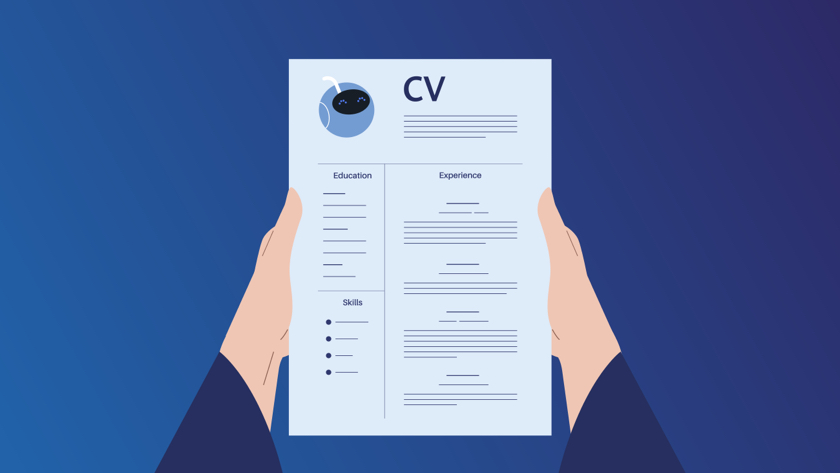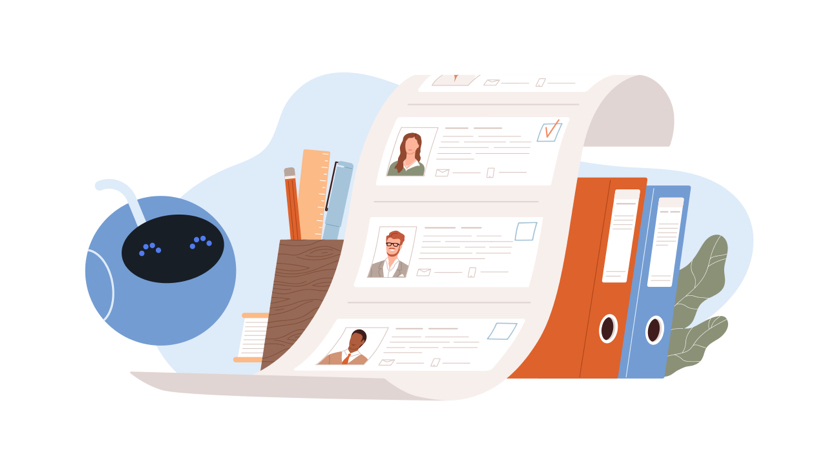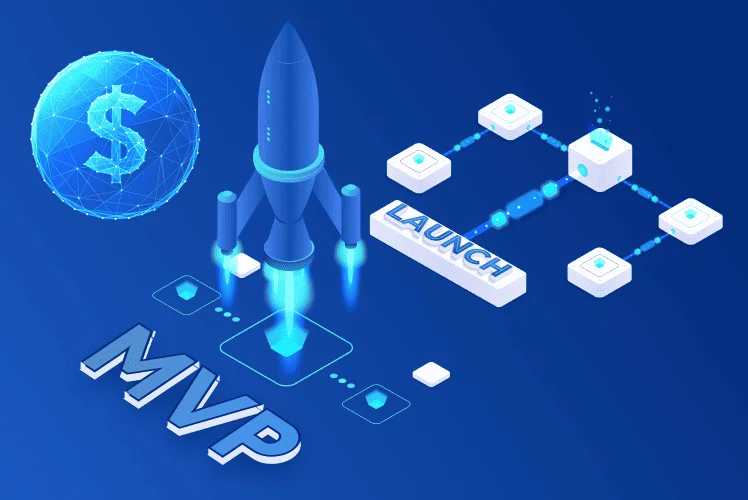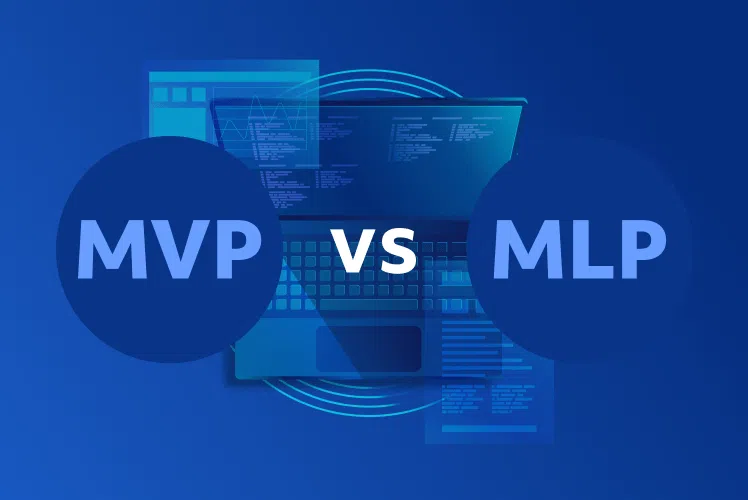As the working environment changes due to technological advancement, so do the employers’ requirements and employees’ expectations. Legacy HR processes simply do not fit into the new labor market reality and Artificial Intelligence is one of the best ways to take these processes to a new level. But despite all the benefits that AI brings to the HRM industry, there are certain areas where it can never replace humans – and in this article, we will look at the good, the bad, and the ugly of AI in HR.

The current state of Artificial Intelligence in Human Resources
While everyone talks about AI invading HRM, nothing speaks better about a certain trend than numbers. Hence, before dissecting the role of AI in HR, let’s first look at some statistics:
- According to Oracle, 64% of people would trust a robot rather than their manager (which is a bit upsetting in regard to the management-employee relationships);
- The study by Tidio states that 68% of recruiters believe that AI would help eliminate unintentional bias;
- The same study states that 44% of respondents believe Artificial Intelligence will significantly free the recruiters’ time and hence make their jobs easier and more efficient;
- As per IBM, 66% of CEOs think that AI can drive great value in current human resource processes – and judging by available AI capabilities, they are not far off the mark.
Of course, many people are also worried about AI taking away their jobs or drastically transforming the existing structure of most HR departments. However, AI is not here to take away jobs and transform HR processes into heartless and automated ones. The main idea behind using artificial intelligence for HR is to elevate what’s already here and help both employers and employees meet their goals faster.
As for the current use of AI for HR, most companies use it to automate certain mundane tasks (i.e. resume screening) or use smart chatbots to answer the most common questions automatically. While there are many more use cases of AI in HR, most companies still have to embrace its adoption and use AI to its fullest potential, not just for several minor tasks. But on the contrary, there are many companies that have already unlocked the AI potential and use it at full capacity for managing their HR processes. Examples of such companies include Glassdoor, Jibe, Jobvite, Scannel Solutions, and Imaginatik.
The main challenges of modern HRM
Even though there are hundreds of available software solutions that are aimed at facilitating HR-related processes, HR managers still struggle with several big challenges that never seem to go away. Let’s take a closer look at them.
Outdated processes
While trying to balance all the processes happening within a company, HR managers often do not notice that some of them are desperately outdated and have to be changed for the sake of better hiring and better management of employees’ well-being and satisfaction. Examples of such outdated processes are:
- Massive amount of paper documentation instead of digital documents;
- Interview questions that do not really bring value either to an interviewer or to the candidate;
- Biased hiring decisions;
- Rigid policies and inability to adapt to changes;
- Rare and strict performance reviews instead of encouragement and motivation programs.

As you see, some things that worked perfectly, say, 20 or ten years ago are simply not applicable to the modern labor market. And yes, you can (and should!) review your processes and constantly improve them but AI can help you do so much faster.
A reactive instead of a proactive approach
In most cases, it comes as a surprise to an employer when an employee decides to leave the company. Of course, HR managers try to predict the possibility of one’s leave but most action is taken after an employee leaves the company – not before. And here is where another big challenge comes in.
Most companies prefer a reactive approach to their HR management, meaning, they react to an event instead of proacting and forecasting it. So if we continue with the example above, a proactive approach would imply a constant and careful analysis of employees’ performance, engagement, and motivation with an aim to prevent their leaving and to retain talents.
Biased decision-making
Bias remains of the biggest issues in modern HR processes and sometimes great candidates are missed due to bias. While AI recruitment can be biased too (more on that below), in general, it guarantees impartial evaluation of candidates and thus can help resolve related issues such as lack of diversity at a workplace.
The many ways AI transforms existing HR processes
All the challenges listed above can be resolved by implementing artificial intelligence but of course, the list of AI uses cases in HR is much bigger. Below we will list the main areas of HR where AI is widely used but first, let’s quickly review the main advantages of using AI in HR software:
- Automation of manual processes: by using artificial intelligence in human resources, managers can perform specific tasks (i.e. resume screening or providing feedback) much faster;
- Better personalization: due to AI’s ability to analyze massive data sets, AI-powered systems can analyze every employee in a company and, based on the current and historical data, provide personalized suggestions (i.e. on career development);
- Risk management: AI-based forecasting allows companies to identify possible risks (i.e. employee’s leave) in advance and prevent or mitigate them.
Now, let’s look at the main areas of human resource management and see how artificial intelligence can transform them.
Screening and recruitment
It takes an overwhelming amount of time to manually screen through candidates’ resumes and to find the most suitable ones. And because it’s such a time-consuming process, HR managers can make mistakes (like calling the candidate the wrong name or mistaking their position) which, in turn, immediately forms a strong negative impression about a company.
AI-powered tools use smart algorithms, based on machine learning, that analyze keywords used in resumes, to find the most suitable ones. In addition, AI is unbiased so it also eliminates bias from the screening process.

When it comes to recruitment, AI can help HR managers with the following:
- Chatbots for communication with candidates in order to provide the main information about the company and answer FAQs;
- Creation of personalized job offers after analyzing the local market, offers by competitors, and more;
- Prediction of the candidate’s performance and their likelihood of accepting the offer;
- Comparison of the candidate to the company’s top performers in similar positions.
Onboarding
We’ve already written an article on employee onboarding so we won’t go into much detail about all the benefits that onboarding brings. The main things to remember are that onboarding greatly increases employee retention and engagement, forms a positive company image, increases employee satisfaction, and speeds up the adaptation process. So where does AI fit in the onboarding process?
First, AI can greatly speed up certain administrative processes, such as the delivery of necessary documents and their processing or provision of all needed credentials and information. Second, AI-powered assistants can answer most questions that newcomers often have as well as provide personalized advice and tips. And obviously, AI assistants can walk newcomers through the main steps of onboarding while also providing feedback to managers.
Obviously, you cannot remove a human factor from the onboarding process since it’s all about people interacting with people. But artificial intelligence can greatly facilitate certain tasks that can be performed without intervention from the employee’s manager. This approach will allow managers to focus on more critical issues (i.e. performance reviews) while employees will be offered needed assistance 24/7.
Performance management and career development
Remember we talked about a proactive approach toward human resource management? This is where AI steps in and helps manage employees’ performance in the following ways:
Personalized succession planning based on employee performance and analysis of possible areas of professional development;
Regular and consistent performance monitoring and feedback collection;
Analysis of the market and timely proposition of relevant compensations and bonuses;
Identification of flight risks and timely notifications of managers concerning the possibility of employee leave.

In terms of performance management, AI comes as a valuable assistant who helps HR managers not to miss a single thing regarding the employees’ well-being and satisfaction. Thus, AI contributes to retaining talents within an organization and assisting them to grow which, in turn, leads to a healthy work environment and robust relationship between the company and its employees.
Employee training
One more important aspect of HRM where AI can be of help is employee training. Right now, HR managers are facing several challenges, such as the fragmentation of departments (and hence, lack of transparency) and lack of time and efficiency when managing processes, related to employee learning.
Artificial intelligence can significantly leverage your training programs in several ways. First, technology can add personalization to training by analyzing one’s skills and knowledge as well as areas of interest and possible development opportunities. Second, the use of artificial intelligence for HR facilitates collaborative learning and thus increases the transparency level within the organization. Third, AI provides constant data collection and analysis regarding employees’ performance and learning progress which allows managers to timely suggest improvements, courses, and training options.
Expert Opinion
Using AI in HR processes has clear advantages and can revolutionize traditional HR operations, but it comes with nuances. AI’s ability to automate repetitive tasks like resume screening and candidate matching allows HR teams to operate more efficiently and focus on strategic functions like employee development and company culture. AI also enhances decision-making with predictive analytics, helping to forecast employee performance, engagement, and turnover, making retention efforts more targeted and proactive.
However, concerns around bias in AI algorithms and the loss of human touch in areas like recruitment and employee relations must be considered. While AI can enhance efficiency and decision accuracy, it’s critical that HR professionals remain involved to ensure fairness, ethical practices, and personalization in employee interactions. Balancing AI with human oversight is key to success.
So can AI really replace humans in HRM?
The biggest misconception one may have is that the use of artificial intelligence in human resources will lead to the technology replacing people and fully managing all HRM-related processes. While AI is a powerful tool that can take care of many tasks, it cannot replace even the most basic human interaction simply because a machine does not have empathy and is not capable of emotions. And since human resource management is all about the well-being of employees, both mental and physical, a machine cannot fully comprehend how to take care of one’s mental health and what emotional triggers work the best in encouraging and motivating people.
One more thing to keep in mind is that the implementation of AI comes with certain challenges and risks to be considered in advance. For instance, people teach machines how to perceive certain data – and if this data is biased from the start, before entering the ML model, then the machine will have no choice but to deliver biased results. And it won’t be the machine’s fault – it will be a human error that people may not be even aware of.
Another thing to consider is cybersecurity. The more technologies a company adopts, the bigger the cyber risks grow and that’s one thing any business should be aware of. When a company decides to adopt an AI-based solution, it should also review its cybersecurity strategy and if needed, implement new security policies. Since AI processes big amounts of sensitive data, you’d want this solution to be as secure as possible in order to prevent the possibility of a data breach.
Summing up, the use of AI for HR can significantly transform the industry and help managers review and reorganize the processes – but it’s not the only success factor. Organizations need to rework their HRM processes on all levels in order to establish long-lasting relationships with employees and ensure a sufficient level of transparency and trust.



Comments